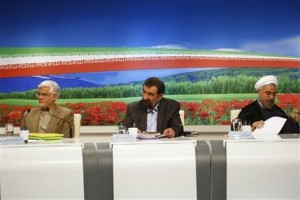 The eight candidates�standing in Iran's forthcoming election have made stand against quiz show-like format of TV debate
The eight candidates�standing in Iran's forthcoming election have made stand against quiz show-like format of TV debateWhen the eight candidates standing in�Iran's forthcoming election returned to the Islamic Republic of Iran Broadcasting (IRIB)'s studio for a second live debate on Wednesday, one element was missing: there was no sign of the multiple-choice questions of the first round that had led many viewers, and even some participants, to comment it had been more like a quiz show than a live TV debate.
Last week, newspaper headlines in Tehran were focused on the controversies about the format of the debate, rather than the candidates' economic policies. With eight candidates competing during an extremely tight election calendar, it was never going to be easy for the state-run television network to find a format that would successfully feature all contenders on stage at the same time. To the dismay of the candidates and voters, the idea of a quiz-like element was not a success.
"In honour of the dear people of my country I will sit here, but I will answer none of your test questions," said Mohammad-Reza Aref, a pro-reform candidate who was first to object on Friday. As the broadcaster's trusted moderator threw a string of multiple-choice questions at the candidates, Aref refused to answer many of them, saying he had no comment. In the final part of the programme, the candidates were shown pictures on a screen and were asked to say the first thing that came into their heads. One mistook a picture of a mining scene for a tourist scene. Hasan Rouhani, the only cleric among the eight candidates, described the format as "insulting" and demeaning to viewers.
Mohsen Rezaee, a former commander of the elite revolutionary guards, echoed Aref's frustration. "I am a patient person and I can tolerate a lot," he said. "With these repetitive, discontinuous, short, one-to-three minute answers, the people are being harmed and the eight people up here are being insulted." A barrage of jokes followed Friday's debate on social networking websites with one suggesting the contenders would probably be asked to show their painting skills in the next session.
On Wednesday, when the candidates gathered for a second round of debate, this time on the subject of culture and society, the format had completely changed. The seating of the candidates was chosen after a draw and each was given four minutes to give a speech on his main cultural and social policies. The remaining seven were then asked to comment on the speaker's speech.
It soon became clear that the contest, which is less than 10 days away, is shaping up to be a race between Hassan Rouhani and Mohammad-Reza Aref on the pro-reform side and Saeed Jalili and Mohammad-Bagher Ghalibaf on the other, representing the conservatives close to the supreme leader Ayatollah Ali Khamenei. The remaining four showed little ability to challenge their rivals' views.
Aref, a former vice-president under reformist president Mohammad Khatami, seemed to position himself as the most outspoken candidate on the subject of state repression against students and academics as well as online censorship and restrictions on media and publishing books. During his speech, Aref also expressed condolences for the death earlier in the week of Ayatollah Jalal al-Din Taheri, a dissident cleric. During Taheri's funeral on Tuesday, a group of participants chanted "death to the dictator," an apparent reference to Khamenei. There is speculation that Aref and Rouhani might eventually form a coalition and only one of them stand in the election on 14 June.
Saeed Jalili, Iran's chief nuclear negotiator, came across as the most hardline figure willing to keep restrictions on media in place and unapologetic about the state's crackdown on students and intellectuals. Speculations are rife iIt is generally thought in Iran that Jalili is Khamenei's favourite in the race but during a speech on the anniversary of the death of Ayatollah Rouhollah Khomeini in Tehran on Tuesday, he said: "The foreign media will soon begin to say that Khamenei prefers one of the candidates. This is wrong. I have no favourite candidate... Any vote by people will be a vote for the Islamic Republic."
The candidates are due to meet again on Friday for their final live TV debate.
By The Guardian
The Iran Project is not responsible for the content of quoted articles.










